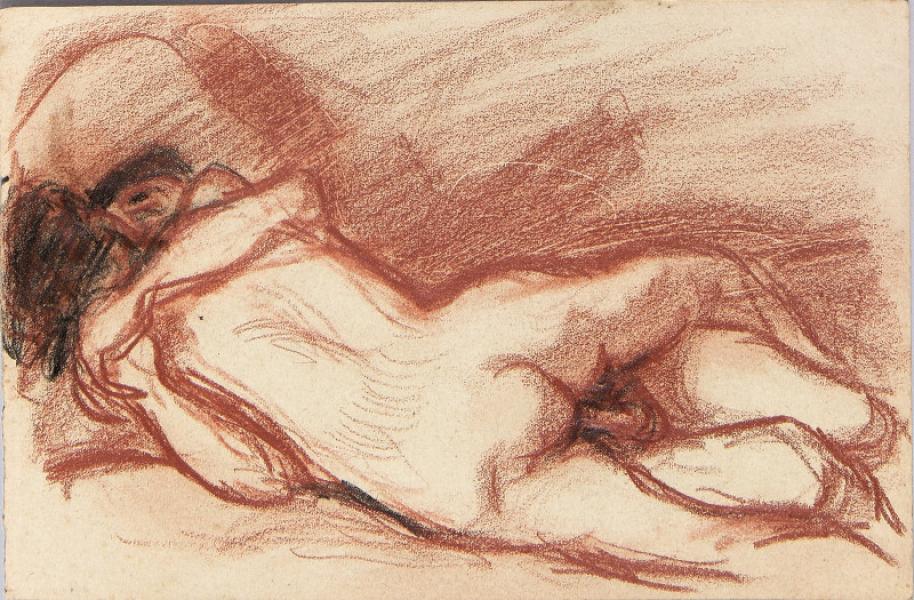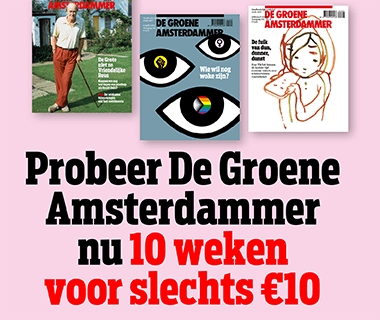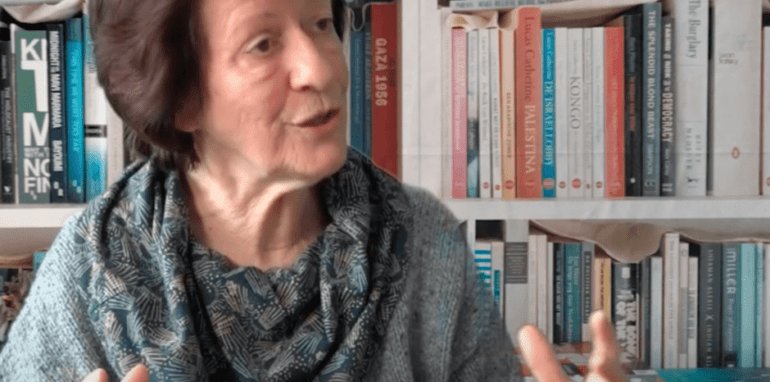[Nederlands onderaan]
(For Ana, on the occasion of her birthday, prepublication from The Playsick Eros. Philosophical Cookerybook for Wall Flowers. The Art of loving for eternal beginners. Introduction to Tantra-Marxism)
Love is blind, they say. When I talked about this with Ana, my regained Spanish love, she referred to an expression: “el amor es ciego pero el matrimonio le devuelve la vista“: love is blind but through marriage you regain sight. Folk humor. It is undeniable that falling in love triggers and presupposes an idealization of the other. Also according to Freud, falling in love is nothing more or nothing less than projection of ego-libido, remember. This idealization presupposes a certain blindness: the other is so magnificent that you cannot or will not see the dark sides. But the daily grind of a long-term relationship, the cares and burdens of life make that in marriage your eyes open. The French have also come up with a joke about it. Does a woman ask her husband after thirty years of marriage if he has really never cheated on her, she wants to know. He replies, “je ne t’ai jamais trompé, mais je me suis trompé. (I didn’t cheat on you, I was mistaken). Tragicomic.
Now, instead of going into the blinding of infatuation and sobering up here, the often harsh awakening of marriage, which could soon prove redundant (as I have written about it earlier), it seems to me more interesting to focus on an important aspect of the love-making business: it is undeniable that the sense of sight is consciously or unconsciously excluded in love. Those who enjoy or want to enjoy pure lust involuntarily close their eyes during lovemaking. So also in this sense one could say that love is blind, or at least that part of the pleasure of love consists in a return to the pure lust of the sense of touch. Against the detached controlling agency of the sense of sight, surrender is served by the closed eyes, which naturally make it easier to concentrate on the sensations of the body. One who enjoys involuntarily closes the eyes. It is the same with intense listening to music. But there the shutdown of the sense of sight is slightly different: it is in order to be able to listen better, it is often conscious or semi-conscious, in sexual, libidinous enjoyment it is stronger than yourself, you would like to look, and eagerly, but you simply can’t anymore, your eyes break with pleasure. With all due respect to the music, but it doesn’t get that bad…
In short: deep, intense enjoyment presupposes closed eyes, so to speak. By the way, according to a book on sexuality we had to read in Leuven from Mr. Pastor Professor, the wink is an allusion to closed eyes during love, and thus an improper gesture toward a woman. Liked it. Si non è vero è ben trovato.
This return to the sense of touch, to the mere body, the sinking into surrender to lust, is, of course, delightful. However, there is also a somewhat disadvantageous side to it: relationality can be lost. The love business takes on something anonymous. What I called, in reference to my Parisian ex-girlfriend, who always kept her eyes shut tightly during lovemaking and preferred to roll around in pitch darkness, ‘ le sexe au noir’ (sex in darkness): the loss of the personal, the relational. When I was making love to her, I was reminded, also perhaps because she was rather preoccupied with psycho-analysis, that Lacan had a point after all with his famous statement that there is no sexual relationship: “il n’y a pas de rapport sexuel.” The closed eyes point to that non-relationship, that anonymity.
Against that sex in the dark, I contrasted “eroticism in color”. Eroticism that uses all the senses and sets itself up in brightness under the watchful eye of the sense of sight and takes place outside of bed rather than in bed perhaps, or at least “occupies the space of entire life,”(to quote the favourite poem of my youth by Lucebert) and is not limited to pitch darkness or closed eyes. An eroticism that has no break between the ordinary daily life and the erotic, but rather nestles and pleases itself in that very continuity. While the pitch darkness of my ex-girlfriend, and of several other girlfriends for that matter, does mark a strict separation. Sex almost like another world, a dark world. It is so in many cultures, especially since the rise of Victorian morality…
Watching your partner’s orgasm, sharing the pleasure in and through the breaking eyes, I personally find one of the very best moments of love. It takes a superhuman effort from my new love Ana not to close her eyes at the height of pleasure, but when she succeeds, I would be intensely happy and grateful that if she one day would share that supreme surrender of the breaking eyes with me. We will get there, maybe…
During a Saturday morning video chat in bed, Ana and I were once again talking about blind love and the text about it that I was working on. And she talked again about not being able to keep her eyes open during lovemaking because she could feel less, because in love the skin is the primordial sense, that the open eyes break open that membrane sensibility, as she called it. According to her it had something to do with the fact that skin and nervous system were one in the embryonic phase. I thought that idea of a kind of closed blind world of pure touch, of pure sensibility was a very beautiful image and asked her to perhaps write something about it, I received the following email:
“I am on you. You are inside me. You want me to open my eyes, you even pull open my eyelids with your fingers. You want to see my eyes, my soul, you say. But I don’t want to see. I want to feel my skin and your skin rubbing against each other. Your fingers on my skin, on the outside. Your sex inside my sex, on the inside. I want to feel the heat, the fever, growing more and more intense, outside my skin, inside my sex…. I want to smell your skin, my skin, your sex, my sex…. (This is only possible when I am lying next to you, because when I see you on the screen, I only have images of you, I have neither your smell, nor your heat, nor your taste.)
I want to hear my moans, your moans. I want to hear your heart, your heartbeat, my heartbeat. I want to taste the taste of your skin, of your sex. I want to feel how I liquefy, how I spray your sex with my love juice. I melt completely for you… Because hearing your heart and my heart beating harder and faster and faster at the same time is the way to end in a moan that is almost about to go to the other side, to the side of dreams and desire. Because I love you with all my heart.”
I responded that I would translate and use this for my text about blind love and about skin as a primordial sense. But she was angry, or at least played angry: “No te quiero, no te quiero nada de nada, no eres romàntico. (I don’t like you, I don’t like you at all, you’re really not romantic). I replied that it was half joking, that I did see the romance. But that I was precisely looking for that theory of skin as membrane.
When I asked her to read the final version when we finally met again in the flesh, to check whether she liked it and thought it publishable, she came back to the genesis of the embryo in a more systematic professorial way: ‘the embryo has three layers, the endoderm, the mesoderm and ectoderm, the first is the visceral system, the second is the beginning of muscles and bones, and third is the origin of both the skin and the nervous system. So carinio, you finally understand? Moreover, the first sense that humans have is the tactile, and the last one we loose when we die, so is the longest lasting sense of all them, carinio.’ That was enlightening.
The explicit erotic text that she sent me in contrast made me realize that the synthesis of the intimate and the explicit, of the romantic and the pornographic is perhaps the best definition of what I called centuries ago “the pantheistic eros”. The ironic romanticist dreams of this supreme synthesis of opposites: romantic pornography. Now I just hope she forgives me, and doesn’t say that she was wrong about me, and that her eyes have been opened.
[Dutch]
Over blinde liefde en romantische pornografie
(voorpublicatie uit De speelzieke Eros. Filosofisch kookboek voor muurbloempjes. Liefdeskunst voor eeuwige beginners. Inleiding tot het tantra-marxisme, naar aanleiding van Ana’s verjaardag)
Liefde is blind, zegt men. Toen ik het daar met Ana, mijn hervonden Spaanse geliefde, over had, verwees ze naar een uitdrukking: “el amor es ciego pero el matrimonio le devuelve la vista“: liefde is blind maar door het huwelijk krijg je het zicht terug. Volkse humor. Het is ontegenzeggelijk dat verliefdheid een idealisering van de ander op gang brengt en vooronderstelt. Ook volgens Freud. Verliefdheid is niets meer of niets minder dan projectie van ego-libido, remember. Deze idealisering veronderstelt een bepaalde verblinding: de ander is zo schitterend dat je de donkere kanten niet kan of wil zien. Maar de dagelijkse sleur van een langdurige relatie, de zorgen en lasten van het leven maken dat in het huwelijk je ogen open gaan. Ook de Fransen hebben er een grapje bij verzonnen. Vraagt een vrouw aan haar man na dertig jaar huwelijk of hij haar nu echt nooit bedrogen heeft, ze wil het weten. Antwoordt hij: ‘je ne t’ai jamais trompé, mais je me suis trompé’. (voor de Nederlanders: ik heb je niet bedrogen, ik heb me vergist). Tragikomisch.
Nu, in plaats van hier in te gaan op de verblinding van de verliefdheid en de ontnuchtering, het vaak harde ontwaken van het huwelijk, wat al te voor de hand liggend is en al gauw redundant zou kunnen blijken (omdat ik er al eerder over heb geschreven), lijkt het mij interessanter om te focussen op een belangrijk aspect van het liefdesbedrijf: het is onmiskenbaar dat de gezichtszin tijdens het vrijen bewust of onbewust uitgesloten wordt. Wie geniet of wil genieten van de pure lust, sluit tijdens het vrijen onwillekeurig de ogen. Dus ook in die zin zou je kunnen zeggen dat de liefde blind is, althans dat een deel van het liefdesplezier bestaat in een terugkeer naar de pure lust van de tastzin. Tegenover de afstandelijke controlerende instantie van de gezichtszin, is de overgave gediend met de gesloten ogen, die het van nature makkelijker maken om zich te concentreren op de gewaarwordingen van het lichaam. Wie geniet, sluit onwillekeurig de ogen. Dat is ook zo bij het intens luisteren naar muziek. Maar daar is de uitschakeling van de gezichtszin toch nog net iets anders: het is om beter te kunnen luisteren, het is vaak bewust of halfbewust. Bij het seksuele, libidineuze genieten is het sterker dan jezelf, je zou willen kijken, en wel gretig maar je kan eenvoudig weg niet meer, je ogen breken van genot, met alle respect voor de muziek, maar zo erg wordt het toch niet…
Om kort te gaan: diep, intens genieten veronderstelt als het ware gesloten ogen. Trouwens volgens een boek over seksualiteit dat we in Leuven moesten lezen van meneer de pastoor professor, is de knipoog een allusie op de gesloten ogen tijdens de liefde, en dus een onoorbaar gebaar naar een vrouw. Vond ik wel leuk. Si non è vero è ben trovato.
Die terugkeer naar de tastzin, naar het loutere lichaam, het verzinken in de overgave aan de lust, is uiteraard heerlijk. Er is echter ook een wat nadelige kant aan: de relationaliteit kan verloren gaan. Het liefdesbedrijf krijgt iets anoniem. Met betrekking tot mijn Parijse ex-vriendin, die altijd haar ogen stijf dichthield bij het vrijen en liefst in het pikkedonker aan het rollebollen ging, sprak ik van ‘le sexe au noir’. Mijn bezwaar tegen deze anonieme erotiek was de potentiële, de niet onwaarschijnlijke, misschien moeilijk te vermijden, teloorgang van het persoonlijke en het relationele. Deze anonieme erotiek bevat echter ook een moment van bevrijding: het terugwijken van het menselijke ten voordele van het dierlijke. In de periode waarin ik met haar aan het vrijen was, moest ik er, ook misschien omdat ze nogal bezig was met psychoanalyse, aan denken dat Lacan toch wel een punt had met zijn fameuze uitspraak dat er geen seksuele verhouding bestaat: “il n’y a pas de rapport sexuel.” De gesloten ogen wijzen op die non-verhouding.
Tegenover die seks in het donker, stelde ik de ‘erotiek in kleur’. Erotiek die alle zintuigen gebruikt en die zich onder het toeziend oog van de gezichtszin in de helderheid opstelt en zich eerder buiten bed dan in bed afspeelt misschien, of althans ‘de ruimte van het volledige leven’ inneemt, en niet beperkt blijft tot het pikkedonker van de slaapkamer of de gesloten ogen. Een erotiek die geen breuk kent tussen het gewone dagelijkse leven en het erotische, maar juist in die continuïteit zich nestelt en vermeit. Terwijl het pikkedonker van mijn ex-vriendin, en van meerdere andere vriendinnen overigens, wel een strikte scheiding markeert. Seks bijna als een andere wereld, een donkere wereld. Dat is in vele culturen zo, en in het Westen zeker het geval sinds de opkomst van de Victoriaanse moraal.
Het kijken naar het orgasme van je partner, het delen van het genot in en via de brekende ogen, vind ik persoonlijk een van de allermooiste momenten van de liefde. Het vergt van mijn nieuwe geliefde Ana een bovenmenselijke inspanning om op het toppunt van genot haar ogen niet te sluiten, en het is nog steeds niet helemaal gelukt. Niet tot le vrai moment suprême. Maar als het haar ooit lukt, zal ik intens gelukkig en dankbaar zijn dat ze die opperste overgave van de brekende ogen met mij heeft gedeeld.
Tijdens een zaterdagochtend videochat in bed hadden Ana en ik het weer eens over de blinde liefde en de tekst erover waar ik aan bezig was. En ze had het er nogmaals over dat ze haar ogen niet kon openhouden tijdens het vrijen omdat ze dan minder kon voelen, omdat in de liefde de huid terugkeert naar zijn status van primordiaal zintuig: in de embryonale fase zijn huid en zenuwstelsel een. De ogen openen tijdens de liefde breekt dat ‘primordiale membraan’, zoals ze het noemde, open. Ik vond dat idee van een soort van gesloten blinde wereld van pure tastzin, van pure zintuiglijkheid een heel mooi beeld en vroeg haar daar misschien iets over te schrijven. Ik kreeg de volgende mail:
“Ik zit op jou. Jij bent in mij. Je wil dat ik mijn ogen open, je trekt zelfs met je vingers mijn oogleden open. Je wilt mijn ogen zien, mijn ziel, zeg je. Maar ik wil niet zien. Ik wil mijn huid en jouw huid tegen elkaar voelen wrijven. Je vingers op mijn huid, aan de buitenkant. Jouw geslacht in mijn geslacht, aan de binnenkant. Ik wil de hitte voelen, de koorts, die meer en meer intens wordt, buiten mijn huid, in mijn geslacht… Ik wil jouw huid ruiken, mijn huid, jouw geslacht, mijn geslacht… (Dit kan alleen als ik naast je lig, want als ik je op het scherm zie, heb ik alleen beelden van je, ik heb noch je geur, noch je warmte, noch je smaak.)
Ik wil mijn gekreun horen, jouw gekreun. Ik wil je hart horen, je hartslag, mijn hartslag. Ik wil de smaak van je huid proeven, van je geslacht. Ik wil voelen hoe ik vloeibaar word, hoe ik jouw geslacht besproei met mijn liefdessap. Ik smelt helemaal voor jou… Want jouw hart en mijn hart tegelijkertijd harder en sneller en sneller horen kloppen, is de manier om te eindigen in een kreun die bijna op het punt staat naar de andere kant te gaan, naar de kant van dromen en verlangen. Omdat ik van je hou met heel mijn hart.”
Ik reageerde dat ik dit zou vertalen en gebruiken voor mijn tekst over blinde liefde en over de huid als primordiaal zintuig. Maar ze was boos, of toch gespeeld boos: ‘No te quiero, no te quiero nada de nada, no eres romantico’. (Ik moet je niet, ik hou helemaal niet van jou, je bent echt niet romantisch). Ik antwoordde dat het half grappend was, dat ik de romantiek wel zag. Maar dat ik juist op zoek was naar die theorie van de huid.
Toen ik haar wanneer we elkaar eindelijk weer ontmoetten, vroeg de definitieve versie te lezen om te controleren of ze het goed vond en het publiceerbaar vond, kwam ze terug op het ontstaan van het embryo: “Het embryo heeft drie lagen, het endoderm, het mesoderm en het ectoderm, de eerste is het viscerale systeem, de tweede is het begin van spieren en botten, en de derde is de oorsprong van zowel de huid als het zenuwstelsel. Dus, cariño, begrijp je het eindelijk? Bovendien is de tastzin het eerste zintuig dat de mens verwerft, en het is ook het laatste dat we verliezen.” Dat was verhelderend.
Door haar hitsige mail daarentegen realiseerde ik mij dat de synthese van het innige en het expliciete, van het romantische en het pornografische misschien wel de beste definitie is van wat ik eeuwen geleden ‘de pantheïstische eros’ noemde. De ironische romanticus droomt van de opperste synthese van tegendelen: romantische pornografie. Nu maar hopen dat ze mij vergeeft, en niet zegt dat ze zich in mij heeft vergist, en dat haar ogen zijn open gegaan.



 “Franse kernenergie? Ongelooflijk dat hun leugencam...
“Franse kernenergie? Ongelooflijk dat hun leugencam... 









